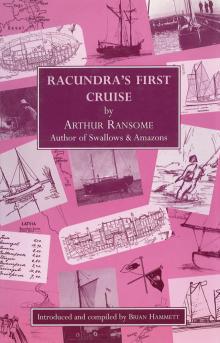- Home
- Arthur Ransome
Missee Lee Page 7
Missee Lee Read online
Page 7
“Gosh, what a chair,” said Roger, ran forward, hove himself up and sat down in it.
It was a huge armchair carved out of the rock. Its arms ended in dragons’ heads and a prancing dragon, in shallow relief, was carved on the back of it.
“Pretty knobbly to lean against,” said Roger. “But it’s a grand place for a look-out post.”
The four of them stared out to sea.
“Straight into the sun,” said John. “It’s no good. If there was a boat out there we couldn’t see it. We’ll come back here later. That path doesn’t go any further. We’d better go and see what there is at the other end of it. Come on, Roger. Off that throne.” And he set off back along the path.
They came to Titty’s blaze, now marked by a cloud of blue butterflies. John walked more slowly, stopping every now and then to listen.
“We don’t want to run into anything before we know,” he said.
“What do we do if we hear someone coming?” asked Roger.
“Hop off the path and lie down,” said John. “And don’t leave a trail like an elephant’s. Get out of sight like a snake.”
“Snakes don’t hop,” said Roger, but Titty was the only one who heard him.
“It’s quite a small island,” said John. “We must be nearly at the other side. Hullo …!” He stopped short.
“What is it?” asked Roger.
“’Sh!” said Susan.
“House,” whispered John. “You stay here and be ready to bolt.”
“Do take care,” said Susan, but John was already out of sight round a bend in the path.
Titty and Roger stood where he had stood. Susan joined them. They saw John going cautiously on. Where the path came out from among the trees they could see a carved red dragon on the corner of a roof of bright green tiles, and beyond it dark water under the great cliff they had seen before landing.
“Come back a bit,” said Susan. “John said we were to be ready to bolt. Don’t let go of Gibber’s lead.”
Minute after minute passed. John came back on the run.
LODGING FOR THE NIGHT
“Nobody there,” he said. “It’s a queer kind of house. I’ve been into it. And the path goes right down to a jetty. But there are no boats. And there’s no other path from the house, only this one.”
“Come on, Gibber,” said Roger. “It’s safe to go ahead.”
The house, when they came up to it, was indeed a queer one. It had a red dragon at each end of the sagging ridge of its roof. There were red dragons at the four corners. The roof overhung the two steps that ran the whole width of the house. Behind the steps was a verandah, and behind that the house was open except for a low wall with an opening in the middle as if for a door. There was a wooden pillar on each side of the opening, so that it looked as if the whole front of the house was made up of a doorway with no door and two big windows with no glass.
“Only one room,” said Susan.
“There’s a sort of inner room built on behind,” said John. “It’s more like a summer-house than anything.”
“Why’s nobody living here?” said Susan.
“The people may have died of plague,” said Titty.
“Rot,” said John. “It’s probably only a summer-house. Not big enough for anything else.”
They went in, treading on tiptoe and whispering as if the owner of the house were asleep there and they did not wish to wake him.
“Somebody is living here,” said Susan who, the moment her eyes had grown accustomed to the shadow, had seen an open cupboard in a corner of the room. “Primus stove … kettle and two cups … and a can of paraffin. …” She unscrewed a cap and sniffed.
“Somebody jolly well is living here,” said Roger. “English too. Look at this.”
In a corner of the room furthest from the entrance there was a low wooden table and a carved stool. Roger was fingering some books on the table.
“Somebody doing Latin lessons,” he said.
“This box is full of tea,” said Susan, still at the cupboard.
“Look here, Susan,” said John. “Cambridge University Tutorial. It’s Virgil’s beastly Aeneid.”
“And a Latin-English Dictionary,” said Titty.
Roger was looking at a thin exercise book. “Translation,” he said. “Just begun. I know that bit. … It’s where Father Aeneas starts spouting. … We had it last term I was at school.”
“If they’re English people we’re all right,” said Susan. “What’s in there?” She was looking through into a small inner room that opened out of the first.
The others, leaving the books, joined her. Somehow, not one of them crossed the threshold into that inner room. A little light came into it through a pattern of square holes left in the side walls and they could see that it was empty except for an enormous red-painted chest on which was standing an upright, oblong block of wood, split half down, painted red, with Chinese characters on it painted in gold.
“It’s a sort of altar,” said John.
“Ought we to be here?” said Titty.
“Why not?” said John. “If it’s all right for people to sweat at Latin here, it’s all right for us.”
Roger had gone back to the books. “English or Chinese?” he said. “Look at this. She’s written her name down often enough.” They looked over his shoulder at the flyleaf of the Virgil and saw a name written again and again.
Li
Miss Lee
Miss Lee, B.A.
Miss Lee, M.A.
Miss Lee, Litt.D.
Dr. Lee, M.A., Litt.D., etc.
They stared at a lot of Chinese characters written at the side.
“Miss Lee,” said Titty. “Don’t you remember what the harbourmaster said?”
“Oh rubbish,” said John. “He said the Chinese used her to frighten their children with. And that was Missee Lee, not Miss. Who’s going to be frightened of a girl doing lessons?”
“But what’s all that Chinese?”
“We’d know Chinese if we were brought up in China,” said John.
“She doesn’t know much,” said Roger. “She’s only got the first four lines. All our chaps put another line at the end, and a picture.”
He showed them at the beginning of the dictionary the Latin rhyme with which students warn people not to steal their books.
“Hic liber est meus,
Testis est deus
Si quis furetur
Per collum pendetur.”
“It’s no good without the last line,” said Roger.
“Anyway,” said Susan. “If it’s a girl doing lessons here she won’t mind us using the house. We’d better bring the things from Swallow.”
“Let’s sail her round,” said Titty.
“Better where she is,” said John. “For one thing, nobody can see her there. And we might want to bolt in a hurry. And anyhow, we’ll have to watch on that side of the island for Captain Flint and the others.”
“We are going to sleep here tonight,” said Susan. “One night in Swallow’s enough and we’ve got no tents. All hands to fetch the things.”
“Let’s just have a look at the jetty,” said John.
The path went down from the house to a pleasant little bay with a stone jetty, a very tempting place to bring a boat. But John had already looked across the water to the steep cliff on the other side. There, too, at the foot of the cliff he had seen a landing place, and had seen a track zigzagging up the cliff behind it. He pointed it out to Susan.
“No houses,” said Susan. “And I can’t see any people.”
“Let’s go out on the jetty,” said Titty.
“Don’t leave the trees,” said John. “We don’t want to be seen by anybody till we’ve seen what they’re like.”
“We’ll bring our things into the house,” said Susan.
“All right,” said John. “Let’s go and get them. Where’s Roger?”
They turned back and met Roger coming out of the house.
“I’ve put
in that line she didn’t know,” he said. “She ought to be jolly pleased. I’ve done the picture too.”
“Roger!” exclaimed Susan. “In someone else’s book.”
“I haven’t made a mess of it,” said Roger. “She’d have put it in herself if she’d known it.”
Susan hurried up the steps and into the house. John and Titty followed her. The dictionary lay open. The rhyme on the flyleaf was now complete:
“Hie liber est meus,
Testis est deus
Si quis furetur
Per collum pendetur.”
and then in Roger’s handwriting:
“Like this poor cretur”
There was a picture underneath it.
“Have you got an indiarubber, Titty?” asked Susan, grimly.
“My pencil’s a copying one,” said Roger.
“So it is,” said Susan, bringing the dictionary to the front of the house where there was more light. “We can’t ever get it out.”
“It’ll make an awful mess if you try,” said Roger. “And anyway, I’ve done it very carefully.” He looked sideways at his own drawing and could not help chuckling.
“But it’s not your book,” said Susan.
“Roger,” said John. “You’re not fit to be counted able seaman. You’re just an ass. A silly ass, and you may have dished the lot of us. If that girl’s cross about your making a mess in her book it’ll serve you jolly well right. But it’ll be beastly for all of us. It’s done now. Come on and help to carry things.”
No more was said about the dictionary, even by Roger, though for some time, until he forgot about it, he was telling himself that everybody was very unfair. It was a jolly good drawing, anyway, and anybody would be pleased to have it.
One journey was enough to bring from the boat everything they had saved from the Wild Cat. John carefully stowed Captain Flint’s sextant and the nautical almanac in a corner of the larger room. Susan began to arrange the sleeping-bags to turn the place into a dormitory. Roger, keeping well away from the table with the books, though he rather wanted to have another look at his drawing, prowled round, and Susan was just going to tell him to keep away from the cupboard when he brought out his hand with a small tin box he had found behind the kettle.
“What’s this?” he said, opening it and sniffing. “Little squares of jelly.”
“You’re not to eat one,” said Susan.
“Not going to,” said Roger. “You may. It’s methylated. Solid.”
Susan took the box from him, sniffed at the little cubes and looked at the lid. “Meta Fuel,” she read. “And it came from Singapore,” she added looking at the label on the outside.
“They must be English people,” said Titty.
“I’m going to make tea,” said Susan. “If this stuff’ll work for lighting the Primus.”
“Somebody else’s Primus,” said Roger.
“That’s altogether different,” said Susan. “I’ll clean it afterwards. If the people were here they’d make tea for us themselves.”
“Hurry up,” said John. “We ought to be looking out to sea.”
“They’d better have a proper meal,” said Susan.
Already she had shaken the Primus stove and found that it had some oil in it. She took two of the little cubes of Meta and put them in the place for the methylated spirit. She found a cleaner and cleaned the nozzle. She put a match to the Meta. The little cubes melted and turned into something exactly like spirit, with a blue dancing flame. They watched till the flame began to die down, when Susan closed the valve and gave a few strokes with the pump. The Primus started up with a joyful roar.
“What about water?” said Roger.
“Quick, quick. Go and look for it,” said Susan.
“There’s a trickle running down by their landing place,” said John. He took the kettle and ran off. He brought it back full. “It’s fresh all right,” he said. “There must be a spring somewhere.”
Ten minutes later the kettle had boiled and Susan was making tea by dropping in a handful of tea-leaves and stirring them round with the spike of her scout-knife. John was opening a tin of pemmican from the box of iron rations. Titty was getting out the biscuits. “Two each,” said Susan over her shoulder. Roger was counting the slabs of chocolate that were left.
“We’ve left the mug in Swallow with the water-beaker,” said Titty.
“Two cups here,” said Susan.
“Jolly little ones,” said Roger.
“Big enough,” said Susan.
“And someone else’s,” said Roger. “Like the Primus, and the methylated, and the tea, as well as that beastly dictionary.”
*
There were no spoons, knives or forks in the cupboard but only a bundle of chopsticks, which set them wondering again whether the owners of the house were English or Chinese. But they had not had a square meal since they had eaten curry and sucked oranges in the shade of the Wild Cat’s mainsail. Fingers are as good as forks for putting food in hungry mouths, and not even John’s hurry to get back to the seaward side of the island prevented the shipwrecked sailors from making a square meal now. John made a square meal himself, but long before the others had finished and Roger had said that he thought he could last for a bit after that, John had gone out to the verandah to see if he could see anybody moving on the cliff road or at the landing place across the water, and looked in two or three times to see if the others were ready.
“I’ll just clean the Primus and the cups and the kettle,” said Susan at last.
“Oh, look here, Susan,” said John. “We ought to be watching already, and I’ve got to make sure there’s nobody at the other end of the island. Leave the things till we come back.”
“It won’t take a minute,” said Susan, and he knew that it was no good arguing.
“All right,” he said. “Go along the path to the stone chair as soon as ever you’re done. Keep together. I’ll meet you there. I’m going round by the shore. … All right. I’ll keep along the edge of the trees. Somebody’s got to make sure, and it’ll take longer if we all go. But do buck up.”
“We’ll be at the stone chair before you are,” said Roger.
“I bet you will,” said John. “No path the way I’m going.”
And John had another look round the outside of the house and then, keeping as near the shore as he could without leaving the trees, set out to work his way northabouts round the island.
*
With John gone, Susan was in as much of a hurry as he had been. She posted Roger on the verandah to keep a look out in case anybody might be coming across from under the great cliff. Chinese or English, she did not want to have to deal with them alone. The moment everything was put away as nearly as possible as she had found it, she had a look round the room, thought of rolling up the sleeping-bags, decided that the dormitory effect was neater, put some chocolate in her pocket in case of need, and set off with Roger and Gibber, Titty and the parrot, along the path through the trees.
“I knew we’d get there first,” said Roger as, once more, he sat himself in the big stone chair.
“It may take him a long time to get round,” said Susan, already listening for the noise of John forcing his way through the trees.
“It’s as if ships had never been invented,” said Titty, looking out over the empty sea.
To the left a line of forest with a hill behind it ran out to a distant point. To the right and in front of them shimmering water stretched from below their feet to the horizon. There were no sails, no boats, no plumes of smoke from passing steamships. It was hard to believe that only yesterday they had been somewhere out there watching the end of the Wild Cat and that even now, somewhere out there, Nancy and Peggy and Captain Flint must be afloat in Amazon, sailing in to look for Swallow, unless indeed they had been picked up by a liner on the way to Shanghai or Yokohama or Hong Kong.
They did not hear John’s coming until the moment he came.
“Jolly good Indianing,” said Roger
.
“I’ve been right round,” said John. “Nobody on the island. No more paths. Only that one coming here from the house. So that’s all right. It looks as if there’s a creek or something between that cliff and the land over there where there’s a lot of forest between the hills and the shore. You can see the trees along the shore, looking pretty far away, and then the cliff, and the trees at the bottom of the cliff look much nearer. But you can’t be sure. I couldn’t see any houses or people anywhere.”
“What are we going to do?” said Susan.
“We’ve got grub,” said John. “We’re all right for a bit. What we’ve got to do is to keep a look out. As soon as Captain Flint saw we’d gone he’d guess what had happened. He’d know just which way we’d drift. He’d have a shot at coming after us. He’s got a compass. He wouldn’t want the sextant for that. … Gosh, I wish I’d remembered it when we were towing him to Amazon. Of course the other thing is, Amazon may have started drifting too. They may be quite near. They may be sailing along the coast looking for us.”
“Pretty awful if they sailed past,” said Titty.
“We’ve just got to keep a look out,” said John.
“It’s a lovely wind now if they’re sailing Amazon,” said Titty.
“Gone north-easterly,” said John. “There’s no swell any more. We’re sheltered by that point. But it’s a good wind to bring them in.”
“We may see them any minute,” said Susan.

 Peter Duck: A Treasure Hunt in the Caribbees
Peter Duck: A Treasure Hunt in the Caribbees Racundra's First Cruise
Racundra's First Cruise Great Northern?
Great Northern? Swallowdale
Swallowdale Swallows and Amazons
Swallows and Amazons Winter Holiday
Winter Holiday Missee Lee: The Swallows and Amazons in the China Seas
Missee Lee: The Swallows and Amazons in the China Seas Pigeon Post
Pigeon Post We Didn't Mean to Go to Sea
We Didn't Mean to Go to Sea The Firebird and Other Russian Fairy Tales
The Firebird and Other Russian Fairy Tales Coot Club
Coot Club The Big Six: A Novel
The Big Six: A Novel Six Weeks in Russia, 1919
Six Weeks in Russia, 1919 Secret Water
Secret Water The Big Six
The Big Six Missee Lee
Missee Lee Peter Duck
Peter Duck The Picts and the Martyrs
The Picts and the Martyrs